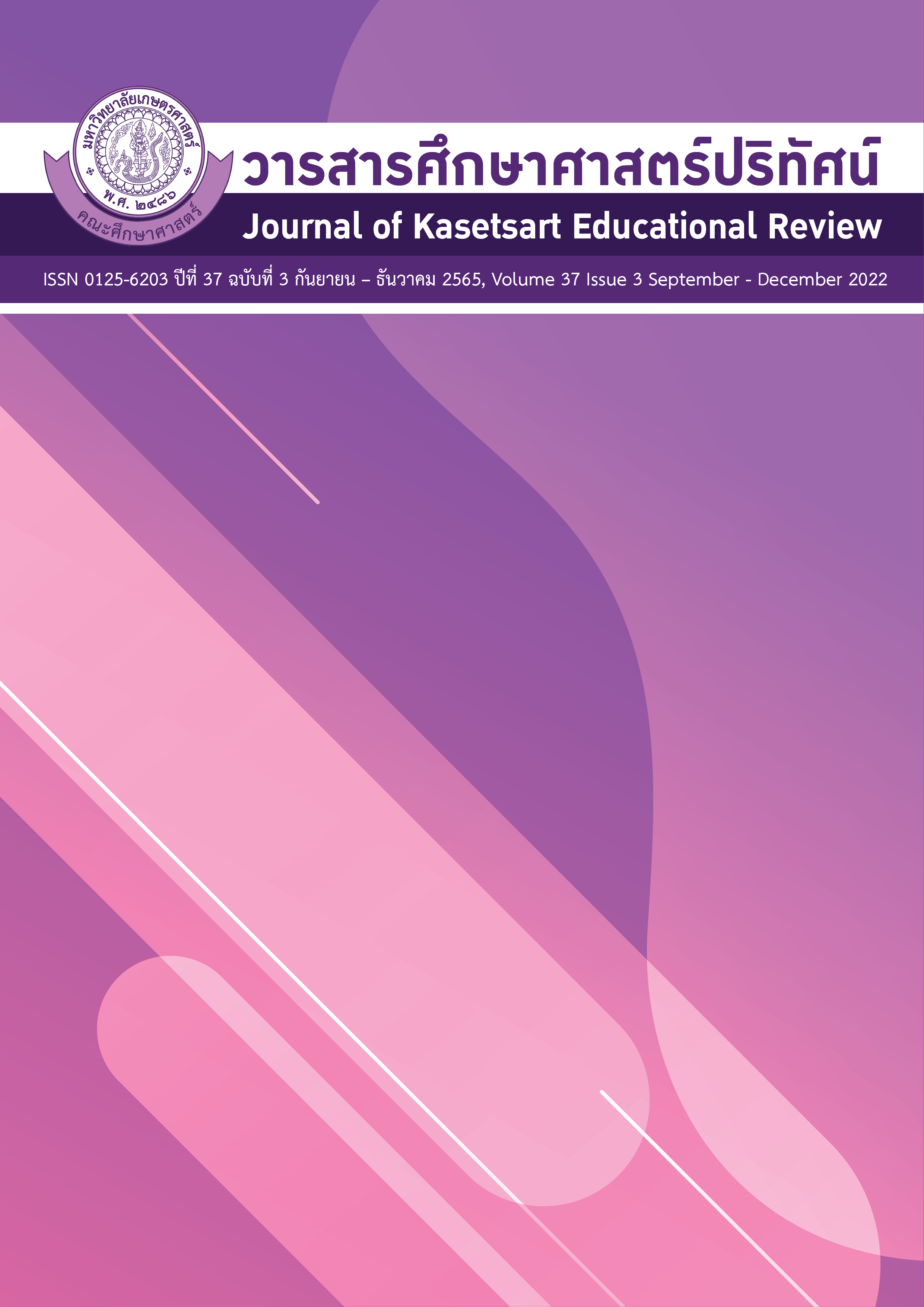ผลการจัดการเรียนรู้ที่เน้นแบบจำลองที่มีต่อความสามารถในการสร้างแบบจำลองทางวิทยาศาสตร์และผลสัมฤทธิ์ทางการเรียน เรื่อง โครงสร้าง หน้าที่และการสร้างเซลล์สืบพันธุ์ของพืชดอก ของนักเรียนชั้นมัธยมศึกษาปีที่ 5 โรงเรียนไตรมิตรวิทยาลัย กรุงเทพมหานคร
คำสำคัญ:
การจัดการเรียนรู้ที่เน้นแบบจำลอง, ความสามารถในการสร้างแบบจำลองทาง วิทยาศาสตร์, ผลสัมฤทธิ์ทางการเรียนบทคัดย่อ
การวิจัยครั้งนี้มีวัตถุประสงค์เพื่อ
1) เปรียบเทียบความสามารถในการสร้างแบบจำลองทางวิทยาศาสตร์ของนักเรียนชั้นมัธยมศึกษาปีที่ 5 โรงเรียนไตรมิตรวิทยาลัย หลังเรียนด้วยการจัด
การเรียนรู้ที่เน้นแบบจำลอง (MCIS) และ
2) เปรียบเทียบผลสัมฤทธิ์ทางการเรียน เรื่อง โครงสร้าง หน้าที่และการสร้างเซลล์สืบพันธุ์ของพืชดอก ของนักเรียนชั้นมัธยมศึกษาปีที่ 5 โรงเรียนไตรมิตรวิทยาลัย ก่อนและหลังเรียนด้วยการจัดการเรียนรู้ที่เน้นแบบจำลอง (MCIS)
กลุ่มตัวอย่างเป็นนักเรียนชั้นมัธยมศึกษาปีที่ 5 โรงเรียนไตรมิตรวิทยาลัย แผนการเรียนวิทยาศาสตร์-คณิตศาสตร์ จำนวน 39 คน ได้มาโดยการสุ่มแบบกลุ่ม เครื่องมือที่ใช้ในการวิจัย ได้แก่ (1) แผนการจัด
การเรียนรู้ที่เน้นแบบจำลอง (2) แบบประเมินการสร้างแบบจำลองทางวิทยาศาสตร์และ (3) แบบทดสอบผลสัมฤทธิ์ทางการเรียน เรื่อง โครงสร้าง หน้าที่และ
การสร้างเซลล์สืบพันธุ์ของพืชดอก สถิติที่ใช้ใน
การวิเคราะห์ข้อมูล ได้แก่ ร้อยละ ค่าเฉลี่ย ส่วนเบี่ยงเบนมาตรฐาน การทดสอบค่าทีและการวิเคราะห์เนื้อหา
ผลการวิจัยพบว่า (1) ความสามารถใน
การสร้างแบบจำลองทางวิทยาศาสตร์ของนักเรียน
หลังเรียนด้วยการจัดการเรียนรู้ที่เน้นแบบจำลองเพิ่มสูงขึ้น โดยอยู่ในระดับดีร้อยละ 48.72 และความสามารถในการสร้างแบบจำลองทางวิทยาศาสตร์หลังเรียนด้วยการจัดการเรียนรู้ที่เน้นแบบจำลอง
สูงกว่าก่อนเรียน อย่างมีนัยสำคัญทางสถิติที่ระดับ .05 (2) ผลสัมฤทธิ์ทางการเรียน เรื่อง โครงสร้าง หน้าที่และการสร้างเซลล์สืบพันธุ์ของพืชดอก ของนักเรียนหลังเรียนด้วยการจัดการเรียนรู้ที่เน้นแบบจำลองสูงกว่าก่อนเรียน อย่างมีนัยสำคัญทางสถิติที่ระดับ .05
เอกสารอ้างอิง
Bryce, C. M., Baliga, V. B., Nesnera, K. L., Fiack, D., Goetz, K., Tarjan, L. M., Wade, C.E., Yovovich, V., Baumgart, S., Bard, D.G., Ash, D., Parker I.M., & Gilbert, G.S. (2016). Exploring models in the biology classroom. The American Biology Teacher, 78(1), 35-42.
Buckley, B. C., Gobert, J. D., Kindfield, A. C. H., Horwitz, P., Tinker, R. F., Gerlits, B., Wilensky,U., Dede, C., & Willett, J. (2004). Model-Based Teaching and Learning With BioLogicaTM: What Do They Learn? How Do They Learn? How Do We Know ?. Journal of Science Education and Technology, 13(1), 23-41.
Chomchid, P. (2009). Teaching and learning science Using a model. E-Journal of The Institute for the Promotion of Teaching Science and Technology, 38(163), 33-34. https://library.ipst.ac.th/ handle/ipst/1235 [in Thai]
Halverson, K. L., & Friedrichsen, P. (2013). Learning Tree Thinking: Developing a New Framework of Representational Competence. In D. F. Treagust & C.-Y. Tsui (Eds.), Multiple Representations in Biological Education (pp.185-201). Dordrecht: Springer Netherlands. doi: 10.1007/978-94-007-4192-8_11
Hestenes, D. (2006). Notes for a Modeling Theory of Science, Cognition and Instruction Proceedings GIREP Conference 2006: Modeling in Physics and Physics Education. Amstel Institute, Faculty of Science University van Amsterdam.
Littlejohn, P. (2007). Building Leaves and an Understanding of Photosynthesis. Science Scope, 30(8), 22-25.
Ministry of Education (2017). Indicators and Curriculum of science department (edition 2017). The Basic Education Core Curriculum B.E. 2551 (A.D. 2008). Office of the Basic Education Commission, Bangkok: Agricultural cooperative printing demonstrations of Thai co., Ltd. [in Thai]
Najang, K. (2011). Effects of Using Model-Centered Instruction Sequence on Ability in Making Scientific Model and Concepts of Laws of Motion and Types of Motion of Upper Secondary School Students. [Master’s Thesis], http://cuir.car.chula.ac.th/ handle/123456789/22025. [in Thai]
The Institute for the Promotion of Teaching Science and Technology. (2019, December 3). PISA Assessment Results 2018. https://pisathailand.ipst.ac.th/ news-12/
Wang, C. Y. (2007). The Role of Mental-Modeling Ability, Content Knowledge, and Mental. Models in General Chemistry Students’ Understanding about Molecular Polarity. (Doctoral dissertation). University of Missouri, Columbia.
ดาวน์โหลด
เผยแพร่แล้ว
ฉบับ
ประเภทบทความ
สัญญาอนุญาต
ลิขสิทธิ์ (c) 2022 วารสารศึกษาศาสตร์ปริทัศน์

อนุญาตภายใต้เงื่อนไข Creative Commons Attribution-NonCommercial-NoDerivatives 4.0 International License.
บทความทุกบทความเป็นลิขสิทธิ์ของวารสารคณะศึกษาศาสตร์ มหาวิทยาลัยเกษตรศาสตร์ วิทยาเขตบางเขน
วารสารศึกษาศาสตร์ปริทัศน์ (Kasetsart Educational Review)






